2021 SoLAR Executive Committee Nominees
January 29, 2021
Current SoLAR Executive Committee for 2021
President – Maren Scheffel, Ruhr-Universität Bochum (RUB), GER
Member at Large – Simon Buckingham Shum, University of Technology, Sydney, AUS
Member at Large – Bodong Chen, University of Minnesota, USA
Member at Large – Nia Dowell, University of California, Irvine, USA
Member at Large – Isabel Hilliger, Pontificia Universidad Católica de Chile, CHL
The SoLAR Executive is pleased to present the following candidates as nominees for election to the SoLAR Executive. Over the years the candidate pool continues to grow with 2021 being our largest group of candidates to date. We are excited to see a great balance of career level (senior, mid-, early-career) amongst our candidates.
There are 16 candidates for SIX available Member At-Large Positions. 4 candidates are current Executive Members running for their second and final term (* denotes a current Executive Member).
There are 4 candidates for ONE available Student Member Position.
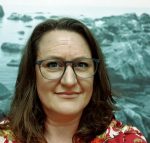 Janine Aldous Arantes, Australia
Janine Aldous Arantes, Australia
Victoria University
Interest in Learning Analytics (Research Area, etc.) & Interest in serving on the SoLAR Executive Committee: I have two broad interests in Learning Analytics and serving on the SoLAR Executive committee:
1. To work with others in the LA community, to further develop educational resources that could be used in training pre-service K-12 teachers concerning Learning Analytics
2. To further develop and work within, a collective Quantitative Ethnography Research Group/s, whether that be in Australia, as part of the current International group or within individual universities
Biography: Janine Aldous Arantes is a Teaching Focused Academic in the Faculty of Arts and Education, at Victoria University. Janine has worked in various educational contexts (K-12/TAFE/Tertiary) for the past 23 years, and currently focuses her research on the implications of integrating digital technologies in schools. She is an Early Career Researcher, who completed her Ph.D. titled ‘Big Data, Black Boxes, and Bias: The Algorithmic Identity and Educational Practice’ from the University of Newcastle in 2020. She is currently working on research associated with preservice teacher understanding of educational technologies, and teachers’ workplace rights alongside the shifting nature of teachers’ identities in digital classrooms.
Working Group Interests: Communications Working Group – with a specific interest in Quantitative Ethnography
Education Committee – with a specific interest in K-12 settings
 Shibani Antonette, Australia
Shibani Antonette, Australia
University of Technology Sydney
Interest in Learning Analytics (Research Area, etc.) & Interest in serving on the SoLAR Executive Committee: My interest in learning analytics is on pedagogical applications of data and analytics to impact teaching and learning practices, particularly with text analysis techniques. In my doctoral research, I worked on automated feedback on student writing and its integration in higher educational classrooms. In my previous research work at the National Institute of Education, Singapore, I employed text mining and machine learning techniques to automatically study teamwork dimensions from text chats. I’m currently a member of the SoLAR executive committee actively involved in the communication and SIG portfolios, which I would like to continue strengthening in terms of new membership and initiatives.
Biography: Shibani is a lecturer and researcher at the University of Technology Sydney (UTS), Australia. She obtained her PhD in Learning Analytics at the Connected Intelligence Centre, UTS. She has a background in computer science engineering and researches on applied areas of computing and data science. Her research interests are learning analytics, writing analytics and artificial intelligence in education. Shibani has presented her work and been a program committee member and reviewer in many LAK conferences. She currently serves on the executive committee of SoLAR (elected as a student member) and co-hosts the ‘SoLAR Spotlight – Conversations on Learning Analytics’ podcast series. She is the recipient of the ‘Future Women Leaders Conference Award’ (2019) for early career female leaders in academia actively involved in the fields of Engineering and IT, and the ‘ACM-W scholarship award’ (2018) from the Association of Computing Machinery, New York for Women in Computing.
Working Group Interests: Special Interest Groups – current chair, Communications committee – current member
 Roger Azevedo, United States
Roger Azevedo, United States
University of Central Florida
Interest in Learning Analytics (Research Area, etc.) & Interest in serving on the SoLAR Executive Committee: I am interested in bridging my interdisciplinary research area which includes examining the role of cognitive, metacognitive, affective, and motivational self-regulatory processes during learning with advanced learning technologies using learning analytics methods and techniques. More specifically, understanding the complex interactions between humans and intelligent learning systems by using interdisciplinary methods to measure cognitive, metacognitive, emotional, and motivational processes and their impact on learning, performance, and transfer. These data can then be used to enhance humans understanding of their and others’ processes using open learning models, data visualization tools, dashboards, etc. while based on learning analytics methods. Being a member of the EC is important to me since I can contribute to SOLAR in various ways based on my interdisciplinary background, expertise in various fields (e.g., learning sciences), areas of research (e.g., self-regulated learning), methodologies for multimodal data collection and analyses, and training and mentoring of young scholars.
Biography: Roger Azevedo is a Professor in the Department of Learning Sciences & Educational Research at the University of Central Florida. He is the Lead Scientist for UCF’s Learning Sciences Faculty Cluster Initiative. He received his doctorate from McGill University (1998) and completed his postdoctoral training in cognitive psychology at Carnegie Mellon University. His main research area includes examining the role of cognitive, metacognitive, affective, and motivational self-regulatory processes during learning with advanced learning technologies. More specifically, he focuses on the complex interactions between humans and intelligent learning systems by using interdisciplinary methods to measure cognitive, metacognitive, emotional, and motivational processes and their impact on learning, performance, and transfer. He has published over 300 peer-reviewed papers, chapters, and refereed conference proceedings in the areas of educational, learning, cognitive, educational, and computational sciences. He is the former editor of the Metacognition and Learning journal and also serves on the editorial board of several top-tiered learning and cognitive sciences journals (e.g., Applied Cognitive Psychology, International Journal of AI in Education). He is a fellow of the American Psychological Association and the recipient of the prestigious Early Faculty Career Award from the National Science Foundation.
Working Group Interests: Special Interest Groups
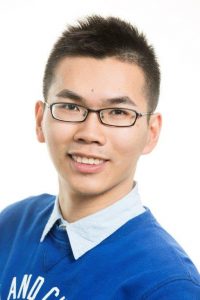 Guanliang Chen, Australia
Guanliang Chen, Australia
Monash University, Australia
Interest in Learning Analytics (Research Area, etc.) & Interest in serving on the SoLAR Executive Committee: Since the start of my Ph.D. study in 2015, I have become an enthusiast of Learning Analytics. At first, my research mainly focused on gathering various types of data to better profile online learners and build more effective tools to facilitate their learning. After dealing with different types of data, currently, I mainly work on applying Language Technologies, especially those built on deep neural networks, to analyze and utilize the textual data collected in various educational settings, such as Q&A in online discussion platforms, tutorial dialogues, essays, and textual feedback carefully-crafted by instructors. If I were to get the opportunity to serve on the SoLAR Executive Committee, this would greatly benefit me in my career development path as an educational researcher, e.g., making acquaintances to more senior members, capturing the trend of the field, getting opportunities to develop and promote initiatives to help countries like China, where Learning Analytics is far under-exploited, to utilize the power of Learning Analytics.
Short biography: Dr. Guanliang Chen is serving as a Lecturer in the Faculty of Information Technology, Monash University in Australia. Before joining Monash University, Guanliang obtained his Ph.D. degree from the Delft University of Technology in the Netherlands. During his Ph.D. study, Guanliang focused on the research on large-scale Learning Analytics, particularly in the setting of MOOCs. Currently, Guanliang is mainly working on applying Language Technologies to build intelligent educational applications. His research works have been published in international journals and conferences such as LAK, AIED, EDM, L@S, EC-TEL, ICWSM, UMAP, Web Science, Computers & Education, and IEEE Transactions on Learning Technologies. Besides, Guanliang has been invited to serve as a PC member and reviewer for international conferences and journals such as LAK, EDM, AIED, ICALT, AAAI, FAccT, ICWL, Computers & Education, IEEE TLT, etc.
Working Group Interests: Inclusion Working Group, Website Working Group
 Mutlu Cukurova, United Kingdom
Mutlu Cukurova, United Kingdom
University College London
Interest in Learning Analytics (Research Area, etc.) & Interest in serving on the SoLAR Executive Committee: I have been actively engaged in the Learning Analytics community for the last five years. I am particularly interested in researching the potential of Multimodal Learning Analytics to continuously evaluate and support human development. My research work focuses on three particular dimensions as summarised below.
1) Computational modelling of complex human behaviours in teaching and learning contexts to provide opportunities for reflection and feedback for effective pedagogical support.
2) The design and use of multimodal learning analytics visualisations/dashboards.
3) Psychological and socio-scientific challenges in the adoption of learning analytics in educational practice.
I am interested in more actively engaging in shaping the future directions of the learning analytics field. Therefore, interested in serving on the SoLAR Executive Committee. I am also an active member of the Artificial Intelligence in Education research community and I hope to be able to better bridge two communities for more effective communication and collaborations.
Biography: Dr Mutlu Cukurova is Associate Professor of Learning Technologies at UCL Institute of Education, University College London. His research broadly addresses the pressing social-educational challenge of preparing people for a future that will require a great deal more than the routine cognitive skills currently prized by many education systems. More specifically, he investigates the potential of emerging technologies, such as artificial intelligence and learning analytics with multimodal data, to continuously support and evaluate human learning. Besides, Mutlu works with Unesco’s international expert group on ICT in education, is on the working group of UCL’s Grand Challenges on Transformative Technologies, is an editor of the British Journal of Educational Technology, and an associate editor of the International Journal of Child-Computer Interaction.
Working Group Interests: Special Interest Groups Working Group and Education Committee
 Yannis Dimitriadis, Spain
Yannis Dimitriadis, Spain
University of Valladolid
Interest in Learning Analytics (Research Area, etc.) & Interest in serving on the SoLAR Executive Committee: I have been involved in Interaction Analysis in TEL environments for more than 20 years. I have focused on selecting meaningful indicators, and analyzing them in terms of learning design, or on how learning design can inform the decisions for learning analytics. Moreover, I have been involved in analyzing learning processes through the lens of learning theory (see LAK20 paper), and with respect to design principles (see LAK21 paper). Additionally, I have been researching in-situ and transfer prediction models in complex CSCL systems, using multiple computational methods. However, my most relevant interest and contributions are related to the agency of the stakeholders and the co-design processes, and how LA can be adopted in practice (see Orchestrating Learning Analytics framework). In this line, I have been strongly involved in HCLA, co-leading the associated LAK21 workshop. Based on the above, and given my senior status, and the leadership of the SNOLA network, I aim at contributing in the SOLAR executive committee with (i) my experience in LA and TEL, being complementary to younger qualified colleagues, (ii) my transdisciplinary view on LA, and (iii) connections with other relevant communities/societies (ISLS-CSCL, AIED, ACM-L@S) and SOLAR sections (e.g., Spain, Latin-America, Australia).
Biography: I (https://www.gsic.uva.es/members/yannis) am Full Professor of Telematics Engineering, University of Valladolid, Spain, and coordinator of the Spanish Network of Learning Analytics (SNOLA). I am also coordinator of the GSIC/EMIC research group (since 1994) an interdisciplinary group in TEL (technology-enhanced learning), integrating over 20 researchers and practitioners from the field of ICT and Pedagogy. My most recent research work has focused on: (i) learning analytics, especially in relation with smart learning environments, (ii) alignment of learning design and learning analytics, (iii) design patterns and DBR methods in TEL-LA, (iv) conceptual and technological support to the orchestration of CSCL processes, (v) active pedagogies at scale, and (vi) across-spaces (Web, 3D worlds and augmented reality) learning. I have participated in more than 50 competitive research projects in TEL, co-authored more than 100 journal papers and 215 conference papers (including several papers at LAK), and organized multiple workshops and symposia, at ECTEL, CSCL, ISLS, etc. I am also a member of IEEE, ISLS, ACM, etc. and spent my most recent sabbatical year working in the LA field at Berkeley, Edinburgh, and EPFL. I have also recently delivered several invited keynotes and webinars on Human-Centered Learning Analytics (HCLA).
Working Group Interests:I would preferably contribute in the following working groups: Events Working Group, SIG Working Group, Communications Group (especially connection with IAALDE, and especially ISLS)
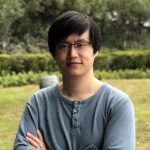 Yizhou Fan, United Kingdom
Yizhou Fan, United Kingdom
University of Edinburgh
Interest in Learning Analytics (Research Area, etc.) & Interest in serving on the SoLAR Executive Committee: Interest in Learning Analytics: MOOC; Self-regulated Learning; Learning Design; Learning Tactics and Strategies; Multimodal Learning Analytics;
Interest in serving on the SoLAR Executive Committee: Help to organize the newsletter of SoLAR, events in the community, and conferences such as future LAK;
Biography: Yizhou Fan is a Research Associate in the School of Informatics at the University of Edinburgh. Yizhou considers himself a learning analyst using computational methods to advance the understanding of online learning strategies and self-regulated learning. He is now working on the FLoRA project (https://floralearn.org/) which aims at providing personalized and real-time scaffoldings to learners to support their better self-regulated learning. Yizhou started working as a team member of the communication working group of the SoLAR executive committee from 2020 and would like to contribute more if possible.
Working Group Interests: Communications Working group
 Ioana Jivet, Netherlands
Ioana Jivet, Netherlands
LDE CEL, TU Delft
Interest in Learning Analytics (Research Area, etc.) & Interest in serving on the SoLAR Executive Committee: My primary research focus is set on the human aspects of learning analytics. I am particularly interested in understanding learner sense- and decision-making when using LA and the factors that influence these processes. With these insights we can derive design requirements for adaptive LA interventions for increased goal achievement in both higher education programmes and MOOCs.
Next to my academic background, my curiosity for teaching and learning has been sparked by my experience as a member and soft-skills trainer in the Board of European Students of Technology, a European student association with over 3300 volunteers. For one year, I served as secretary general in its international board and coordinated the work of different committees. This experience has fueled my interest in building and engaging into a community of like-minded individuals – something I would also like to bring into SoLAR.
I firmly stand by the idea that the potential of learning analytics to optimise learning cannot be fulfilled without the involvement of all its stakeholders. As part of the SoLAR Executive Committee, I would like to work on initiatives that build bridges between teachers, students and researchers, bringing research and practice closer together, both in educational institutions as well as industry.
Biography: I am currently a postdoctoral researcher at the Leiden-Delft-Erasmus Center for Education and Learning based at TU Delft in the Netherlands. After obtaining my Masters degree in Computer Science in 2016 from the same university, I pursued a PhD at the Open University of the Netherlands focusing on designing learner-facing learning analytics dashboards that foster the development of self-regulated learning skills. Over the past years, I have contributed to Competen-SEA, a capacity building project in South-East Asia around MOOCs, and SHEILA, a research project that investigated the adoption of learning analytics in European higher education institutions and built a policy development framework for HEIs to facilitate adoption. At the moment, I am a member of the SoLAR Education WG and the SoLAR SIG LACE.
Working Group Interests: Education and Communication
 Pablo Munguia, Australia
Pablo Munguia, Australia
Flinders University
Interest in Learning Analytics (Research Area, etc.) & Interest in serving on the SoLAR Executive Committee: My learning analytics scholarship focuses on understanding behavioural patterns, metric design, scaling solutions for universities, and philosophy of learning analytics. I have had opportunities to work within a classroom, designing activities that allow data harvesting and feeding back to students for reflection; and working at university level scales, designing dashboards and metrics that provide insights at broad scales. I also have enabled the collaboration amongst universities to enrich our knowledge through sharing. I have been actively engaged with SoLAR activities in the last few years (including being RMIT’s institutional representative and runner up for best reviewer at LAK’19) and believe I can do more for the society’s initiatives and membership. The LAK, LASI and ALASI workshops I have delivered centred on deployment tactics to help scale up learning analytics activities within institutions and would like to continue helping members in this space. I am a keen proponent of inter-institutional collaboration, as exemplified by creating the AUS-NZ Canvas LMS group and would like to promote these types of collaborations amongst SoLAR members and institutions. I would like to help the society increase their lobbying presence in education and EdTech companies leveraging the powerful insights created by our research.
Biography: I am traditionally trained as a marine ecologist (BSc 2000, Universidad de Guadalajara, PhD 2006, Florida State University, postdoc Smithsonian Institution 2006-2008). I started blending my statistical skills with my teaching passion and flipped classroom practice as an assistant professor (University of Texas at Austin, 2008-2013). I migrated to Australia and became faculty at The University of Adelaide, where I created the Learning Analytics Community of Practice. I was recruited to RMIT University in 2017 where I was Director of Learning Analytics, building a centrally-located team of 15 data scientists and analysts tasked with creating and delivering university-wide projects and solutions spanning governance, data infrastructure, learning and teaching insights and academic promotion. Achievements included the creation of centralized databases; design and deployment of student data insights for academics and university governance; and metrics to help improve teaching and student belonging. I joined Flinders University amidst the pandemic, as Associate Director of the Student Learning Support Service where we create resources and deliver learning support to all students using learning analytics via programs and initiatives. I am currently Editor in Chief of a well-established marine biology journal (improving IF from 1.7 to 2.3) and served in several other editorial boards.
Working Group Interests: Inclusion WG, Membership WG.
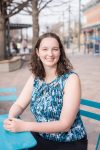 Melanie Peffer, United States
Melanie Peffer, United States
University Colorado Boulder
Interest in Learning Analytics (Research Area, etc.) & Interest in serving on the SoLAR Executive Committee:
I am interested in how learning engineering can be applied to develop and refine technologies for use in classrooms–or how to effectively bring together various stakeholders in a cohesive fashion to improve learning outcomes. Helping others to communicate across boundaries also informs my work in the communications working group, particularly my role as co-editor of the SoLAR-NEXUS Blog. My research over the last few years has focused on using simulation based assessment to measure latent constructs, particularly student beliefs about the nature of science knowledge–a project informed by both my classroom experience and research expertise.
I’d like to serve on the executive committee to help build meaningful connections outside of the community that lead to improved learning, equipping SoLAR members with the skills to communicate across barriers, and developing technologies/analytics that are feasible in real-world classrooms and lead to improved learning.
Biography:
Melanie has a B.S. and Ph.D. in molecular biology from the University of Pittsburgh and completed postdoctoral training in learning sciences at Georgia State University. She is affiliated with the University of Colorado Boulder as a researcher in the Institute of Cognitive Science and teaches as part of the First Year Academic Experience. Her research is focused on how people learn biology, with an emphasis on teaching about the nature of science knowledge and how we can use educational technologies to assess students’ understanding of science.
Melanie is the author of the best-selling book, Biology Everywhere: How the science of life matters to everyday life. Biology Everywhere is a journey through the science of life as told through our daily experiences. The associated Biology Everywhere Massive Open Online Course (MOOC) launched in Fall 2020 and enrolled more than 3,000 people from around the world within the first quarter.
Melanie is currently on the communications working group and co-editor of the SoLAR-NEXUS Blog. She is also launching a science communication MOOC on Coursera in early 2021. When not writing, Melanie enjoys playing her flute and piccolo and enjoying all that Colorado has to offer with her husband and son.
Working Group Interests: I currently serve on the communications working group and interact with the education working group as part of the blogging initiative. I would also be interested in serving on the inclusion working group.
 Paul Prinsloo, South Africa
Paul Prinsloo, South Africa
University of South Africa
Interest in Learning Analytics (Research Area, etc.) & Interest in serving on the SoLAR Executive Committee: Most of the research, theory development and implementation of learning analytics emerged and continue to emerge from the Global North due to various factors such as digital maturity in institutions, exposure to the potential and practice of learning analytics and institutional interest in realising the potential of learning analytics. The potential of earning analytics in the Global South (as plural), and specifically on the African continent is unrealised but there is increasing interest by scholars, researchers, and practitioners from various higher education institutions on the African institution that are increasingly interested in learning analytics. Should I be elected, I would love to intentionally create spaces for African institutions, as well as other institutions in the Global South to participate in SOLAR and develop indigenous responses to the unique challenges, ethical issues but also potential of learning analytics to increase the effectiveness of teaching and learning.
My second objective of my potential election to the SOLAR Executive would be to create and support spaces for specifically considering the ethical dimensions of learning analytics. My own research and continued involvement in the learning analytics community since 2013 have been dedicated to mainstream learning analytics as ethical and moral practice.
Biography: Paul Prinsloo is a Research Professor in Open and Distance Learning (ODL) in the Department of Business Management, College of Economic and Management Sciences, University of South Africa (Unisa). He is a Visiting Professor at the Carl von Ossietzky University of Oldenburg, Germany, a Research Associate for Contact North I Contact Nord (Canada) and a Fellow of the European Distance and E-Learning Network (EDEN) and serves on several editorial boards. In the South African context Paul has a B3 research rating confirming his considerable international reputation for the high quality and impact of his research outputs. His academic background includes fields as diverse as theology, art history, business management, online learning, and religious studies. Paul is an internationally recognised speaker, scholar and researcher and has published numerous articles in the fields of teaching and learning, student success in distance education contexts, the ethical collection, analysis and use of student data in learning analytics, and (digital) identities. He blogs at https://opendistanceteachingandlearning.wordpress.com/ and his Twitter alias is @14prinsp
Working Group Interests: Either the Inclusion Working Group or Special Interests Working Group
 Bart Rienties, United Kingdom
Bart Rienties, United Kingdom
Open University UK
Interest in Learning Analytics (Research Area, etc.) & Interest in serving on the SoLAR Executive Committee: SoLAR and LAK has a special place in my heart since first joining at Poughkeepsie in 2015. I am so pleased to see the quality and rigour of LAK and other SoLAR activities go to unprecedented levels. While a lot of the early work was conceptual, the methodological rigour and intellectual contributions of the community have gone from strength to strength. As one of the founding members The Open University has continuously made strong contributions to use and apply learning analytics at scale. A particular contribution is linking learning design with learning analytics, as also highlighted by the recent special issue in Journal of Learning Analytics with Leah Macfadyen and Lori Lockyer.
At the same time, with Covid19 it has become even more clear how important the role of educators and learners are in effective learning. I would be keen to serve on SoLAR exec to re-connect and strengthen our links with practice. No matter how great our algorithms may be, without understanding what drives people our research might not translate into effective learning. Thus, I would be your advocate for a stronger emphasis on inclusion and diversity, and recognising that learners and educators are all unique.
Biography: Dr. Bart Rienties is Professor of Learning Analytics and programme lead of the learning analytics and learning design research programme at the Institute of Educational Technology at the Open University UK. He leads a group of academics who provide university-wide learning analytics and learning design solutions and conduct evidence-based research of how students and professionals learn. As an educational psychologist, he conducts multi-disciplinary research on work-based and collaborative learning environments and focuses on the role of social interaction in learning, which is published in leading academic journals and books. His primary research interests are focussed on Learning Analytics, Learning Design, and the role of motivation in learning. Furthermore, Bart is interested in broader internationalisation aspects of higher education. He has successfully led a range of institutional/national/European projects, and has received a range of awards for his educational innovation projects. He has published over 250 academic outputs in a range of disciplines, but is most proud of the embedding of several of the educational innovations as “business as usual” at the three institutions he has worked. For the “serious Bart” see https://twitter.com/DrBartRienties, for the “real Bart” see https://www.strava.com/athletes/5325274.
Working Group Interests: Inclusion; Education;
 Zachari Swiecki, Australia
Zachari Swiecki, Australia
Monash University
Interest in Learning Analytics (Research Area, etc.) & Interest in serving on the SoLAR Executive Committee: My main interests in learning analytics include: collaboration analytics, new methodologies and models, simulation studies, epistemology, human-in-loop models, and visualization. I would like to become a member of the SoLAR Executive Committee so that I can help to disseminate learning analytics research within our own community and as well as other disciplines. I also hope to support practitioners outside the research community in finding, understanding, and implementing advances in learning analytics. In addition, I hope to learn from the distinguished researchers and students who currently serve as members of the committee.
Biography: Zachari Swiecki is a Lecturer in Faculty of Information Technology at Monash University and a member of the Centre for Learning Analytics at Monash in the Department of Data Science and Artificial Intelligence. He received his Ph.D. in Educational Psychology from the University of Wisconsin-Madison. His current work focuses on the application of learning analytics to collaborative settings. This work includes modelling collaborative processes in domains such as engineering design, medicine, and the military and designing real-time systems for monitoring team performance. Past projects include the research and development of innovative educational simulations, automated assessment techniques, and simulation authoring tools for educators. In addition, he has played a central role in the development and dissemination of Quantitative Ethnography, an emerging methodology that combines qualitative analysis, statistics, and data science into a single framework.
Working Group Interests: The working groups I am interested in joining are the Communications Working Group and the Education Committee.
 Craig Thompson, Canada
Craig Thompson, Canada
University of British Columbia
Interest in Learning Analytics (Research Area, etc.) & Interest in serving on the SoLAR Executive Committee:
I work with students, faculty and staff at UBC to transition tools from learning analytics research into practice and facilitate access to data and analytical techniques. I have helped organize biannual learning analytics hackathons for students, most recently focused on use of the Canvas API. My research interests focus on using machine learning to predict student outcomes, and I have led workshops and tutorials at LAK and LASI on the topic. I am driven by a desire to empower students and educators with the skills and tools needed to access, make sense of, and act upon their own educational data.
Biography: Craig Thompson is a Research Analyst in the Centre for Teaching, Learning, and Technology at the University of British Columbia where he works on UBC’s Learning Analytics team. This team aims to introduce learning analytics into the regular teaching and learning practice of UBC and to assist in evidence-informed decision making and action.
Prior to joining UBC, Craig worked at the University of Saskatchewan where he implemented several learning analytics projects, including a mass-personalized student advice platform, interactive visualizations of student enrolment and demographic data, and an early alert system to identify and assist students at risk. Craig’s academic background is in machine learning, having earned a Master’s degree in Computer Science from the University of Saskatchewan in 2011.
Working Group Interests: I have served on the SoLAR Executive for the last two years as Treasurer, and for the last year as chair of the Membership Working Group. If elected by the membership, I would like to continue to work in these roles.
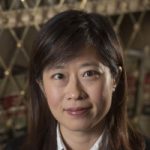 Yi-Shan Tsai, Australia
Yi-Shan Tsai, Australia
Monash University
Interest in Learning Analytics (Research Area, etc.) & Interest in serving on the SoLAR Executive Committee:
My current research aims to enhance learning, teaching, and educational environments with the adoption of digital and data technologies. In particular, I investigate social-technical issues and pedagogical implications around the use of data in education from multi-stakeholder perspectives. As an educational researcher by training, I seek to advance the field of learning analytics taking perspectives of learning theories and socio-cultural theories. Currently chairing the Communication Working Group and working jointly with the Inclusion Working Group on podcast and the Education Working Group on the SoLAR blog (NEXUS), I will be interested in continuing my service to the community by contributing to these portfolios in particular.
Biography: I am a lecturer in the Faculty of Information Technology at Monash University and a member of the Centre for Learning Analytics at Monash (CoLAM). Since embarking on an academic career in 2016, I have played a major role in several local and international research projects on the responsible use of data and technology in education, including an award-winning project, SHEILA (Supporting Higher Education to integrate Learning Analytics), which has informed policy development for learning analytics in over 200 higher education institutions around the world. I joined the executive committee of SoLAR in 2018, assisting with the portfolios of membership and communication. In particular, I have contributed to SoLAR institutional briefs and led the development of a podcast series – SoLAR Spotlight. I have had the pleasure to serve as a publicity chair and poster chair in LAK 20 and LAK 21 respectively.
Working Group Interests: Communication Working Group, Education Working Group, Inclusion Working Group, and Membership Working Group.
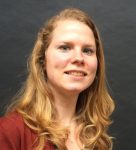 Anouschka van Leeuwen, Netherlands
Anouschka van Leeuwen, Netherlands
Utrecht University
Interest in Learning Analytics (Research Area, etc.) & Interest in serving on the SoLAR Executive Committee:
I would be very happy to serve a second term on the SoLAR Executive Committee. In my first term, as a team we have worked on establishing new ways of reaching the SoLAR community, including the launch of podcasts and webinars. It would be a very nice opportunity for me to continue that work and to fulfill other potential roles within SoLAR to help sustain and grow this valuable organization.
Biography: Anouschka van Leeuwen studied Artificial Intelligence and Educational Sciences and finished her dissertation in 2015, which focused on teacher support of collaborative learning and how learning analytics may aid teachers to enhance their diagnosis and subsequent interventions. In 2015, she obtained a grant to perform a systematic review of the effect of teacher support on collaborative learning. In 2016, Anouschka obtained a Rubicon grant to further study the role of learning analytics in the form of teacher dashboards. She specifically focused on the process how teachers interpret information about students and what type of aid dashboards should offer to support accurate and in-depth teacher diagnosis of students’ behavior. After finishing her Rubicon project, Anouschka has returned to Utrecht as assistant professor where she continues her research into learning analytics in both primary and higher education.
Working Group Interests: Communications
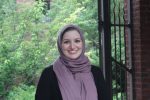 Dana AlZoubi, United States
Dana AlZoubi, United States
Iowa State University
Interest in Learning Analytics (Research Area, etc.) & Interest in serving on the SoLAR Executive Committee: I am interested in the role of teaching and learning analytics dashboards in supporting better human sensing and decision making by visualizing data about learners’ actions and instructors’ teaching strategies. I believe that applications of learning analytics hold promise for a better future through ultimately improving instructors’ teachings methods and students’ learning outcomes. My research focuses on how instructors make sense of analytics and take actions accordingly. For example, I see a great potential for learning and teaching analytics post-COVID, as the lessons learned from the transitions and learning experiences cannot be unlearned; yet, their implications ought to be reaped and used as the building blocks for the future. Had instructors been prepared to make sense and act upon evidence-based data, the transition to online learning would have been smoother. I would like to connect with the learning analytics community, build relationships, and get involved in discussions and decisions that will move it forward. I am very much interested in contributing to the community by serving as an executive member in the SoLAR family.
Biography: I am a third year PhD student in Educational Technology at Iowa State University. I hold a Master’s in STEM education, a Maîtrise postgraduate degree in Biochemistry, and a Bachelor’s in Chemistry. My research lies at the intersection of learning sciences, educational technology, and human computer interaction – three fields that inform my work on the role of technology, specifically teaching and learning analytics, in improving learning environments. My current work aims to examine how instructors’ teaching strategies and methodologies may be informed and improved by interpreting data visualizations (i.e., dashboards) in both in-class and online environments.
I am an instructor of “Design Thinking and Entrepreneurship in Learning Technologies,” a course for preservice teachers minoring in Learning Technologies. I also have worked as an instructional designer and teaching assistant for different online graduate and undergraduate level courses during the past two years. My work experience includes being a teacher and a coordinator of various subjects, including physical science, biology, and chemistry (Grades 7- 12) in American and Lebanese programs for 8+ years. I have also served for five years as an international coordinator at the British Council and an advisor at the Model United Nations.
Working Group Interests: Communications, Special Interest Groups
 Abhinava Barthakur, Australia
Abhinava Barthakur, Australia
University of South Australia
Interest in Learning Analytics (Research Area, etc.) & Interest in serving on the SoLAR Executive Committee: I believe that Learning Analytics has a massive potential to improve current educational practices and expand our understanding of technology-mediated learning. Through my research, I hope to contribute to this goal by bringing together the advances in learning analytics and educational assessment, so that robust and rigorous analytical models could be developed.
I would be honoured to be part of the SoLAR Executive Committee and serve the broader learning analytics community and bring a valuable perspective to the committee. I started my PhD studies right before the outbreak of COVID-19, and I greatly appreciate SoLAR’s support for students, especially during these challenging times. SoLAR’s activities on promoting and advancing learning analytics, such as webinars, podcasts, and blogs, helped me grow my knowledge of learning analytics, and I would be thrilled to contribute to some of these fantastic activities and help their future development.
Biography: Abhinava Barthakur is a second-year PhD student at the Centre for Change and Complexity in Learning, University of South Australia working in learning analytics field. With a background in data science, Abhinava is passionate about using learning analytics to improve student learning experiences and the ways we study and teach online. His PhD research focuses on combining learning analytics and educational assessments to enable better and more flexible assessment of 21st-century skills within online settings. His work is grounded in psychometrics and measurement science and utilizes a wide range of analytics and data science techniques (text mining, classification, supervised and unsupervised methods) and assessment models (Item Response Theory and Cognitive Diagnostic models). His work has been published at the top international journals, including the Australian Journal of Education and Computers in Human Behavior Journal. Abhinava had the opportunity to participate in the 2019 Australian Learning Analytics Summer Institute (A-LASI 2019), which enabled him to connect and build valuable relationships with other learning analytics researchers, and is looking forward to LAK21 doctoral consortium and meeting other fellow students.
Working Group Interests: Education, Website, and Communication working groups
 Rogers Kaliisa, Norway
Rogers Kaliisa, Norway
University of Oslo
Interest in Learning Analytics (Research Area, etc.) & Interest in serving on the SoLAR Executive Committee: My primary research interest is how to make use of learning analytics to support teachers’ everyday practice. Currently, I am following a design-based research approach, working with teachers, designers and technology experts to develop relevant tools that could provide teachers with timely insights about students’ online behaviors. My interest in serving on the SOLAR executive Committee is motivated by the desire to expand the impact of LA in areas of the world that are currently under-represented in the learning analytics community. In particular, coming from Africa, a region that is greatly underrepresented in the LAK community, I expect to play an active role using my position on the SOLAR Executive to spearhead and initiate a special interest group for LA researchers in Africa. I believe, through this approach, together with other members and specifically the inclusion working group, I will be in a position to provide a platform to different stakeholders in African educational institutions to actively engage in LA research. This will consequently contribute to SOLAR’s effort to promote, elevate and foster an open and inclusive environment.
Biography: Rogers Kaliisa is a Doctoral Research Fellow in Learning Analytics at the Department of Education, University of Oslo, Norway. His doctoral research focuses on leveraging social learning analytics to support teachers in making data-informed learning design (LD) decisions in blended learning environments. His research utilizes networked approaches (e.g. social and epistemic network analysis) and automated discourse analysis to make sense of students’ data generated from online learning environments and how it relates to teachers’ intended pedagogical objectives
Working Group Interests: Inclusion Working Group
 Yancy Vance Paredes, United States
Yancy Vance Paredes, United States
Arizona State University
Interest in Learning Analytics (Research Area, etc.) & Interest in serving on the SoLAR Executive Committee: I have been using student clickstream data to understand better how students address their misconceptions as they interact with various educational technologies. The techniques I have been utilizing to analyze the data have been motivated by different methodologies and findings in the Learning Analytics community. Furthermore, I have been applying insights that transpire in the proceedings to improve the educational technology I am building.
I am interested in being more involved and learning more from the community. I have been fortunate enough to attend the LASI 2019 held in Vancouver. I have also been actively serving the LAK community since 2018. I served as the website manager of the LAK19 and LAK21 conferences.
Biography:
Yancy Vance Paredes is a doctoral student in Computer Science at Arizona State University. He is working under the supervision of Sharon Hsiao, PhD and Scotty D. Craig, PhD. His research interest lies in the intersection of adaptive educational systems, educational data mining, and machine learning. He is currently working on understanding and modeling student’s behavior using clickstream data captured from educational technologies. He has been investigating ways to improve online learning systems to address students’ personalized needs (e.g., providing the appropriate resources or feedback at the right time) and help students succeed in class. He has also been looking into designing better and effective resources by identifying best practices from the literature.
More information at https://www.public.asu.edu/~ymparede/
Working Group Interests: As a student majoring in Computer Science and with my prior experience in managing two LAK’s conference websites, I would like to serve under the Website Working Group.
Voting Information: All SoLAR individual and students members are eligible to vote for all positions. Links to access the online voting system will be sent to SoLAR members via email starting on January 29, 2021 (Eastern Time). Voting will end on February 12, 2021 at 11:59pm Eastern. All members who join SoLAR by February 10, 2021 will be eligible to vote and will receive a ballot after successfully joining SoLAR. Any questions, please email solarsocietymgmt@gmail.com.
